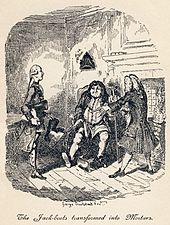The Life and Opinions of Tristram Shandy (Gentleman) was published in nine volumes, the first of which were published in 1759.

Nine volumes? Yes, Tristram Shandy does go on a bit - and more than a bit - but then the idea that a life examined leaves little time to have a life worth living is partly the point.
If this sounds dull then, well, I'm afraid the book is dull if you're wanting something to happen - Tristram Shandy isn't even born until Volume Three - but although the book was written when poor Laurence Sterne was ill, poor and unhappy (and he persisted with it even after his first attempt was rejected by his publisher) it's also very funny if you have plenty of time and (as always) a willingness to be amused.
The book proved hugely popular and Sterne was ultimately rewarded with the curacy of a parish in Yorkshire; but happily this proved to be not nearly as grim as it sounded, and Sterne made a garden there.
Word To Use Today: Tristram. The original Tristram was one of the Knights of the Round Table, but recently, in Britain at least, it's come to mean an executive working in the TV industry, promoted because of his fashionable connections rather than for (or sometimes despite the lack of) any wisdom, knowledge, or innate ability. Tristram seems to have first been used in this sense by AA Gill.


















